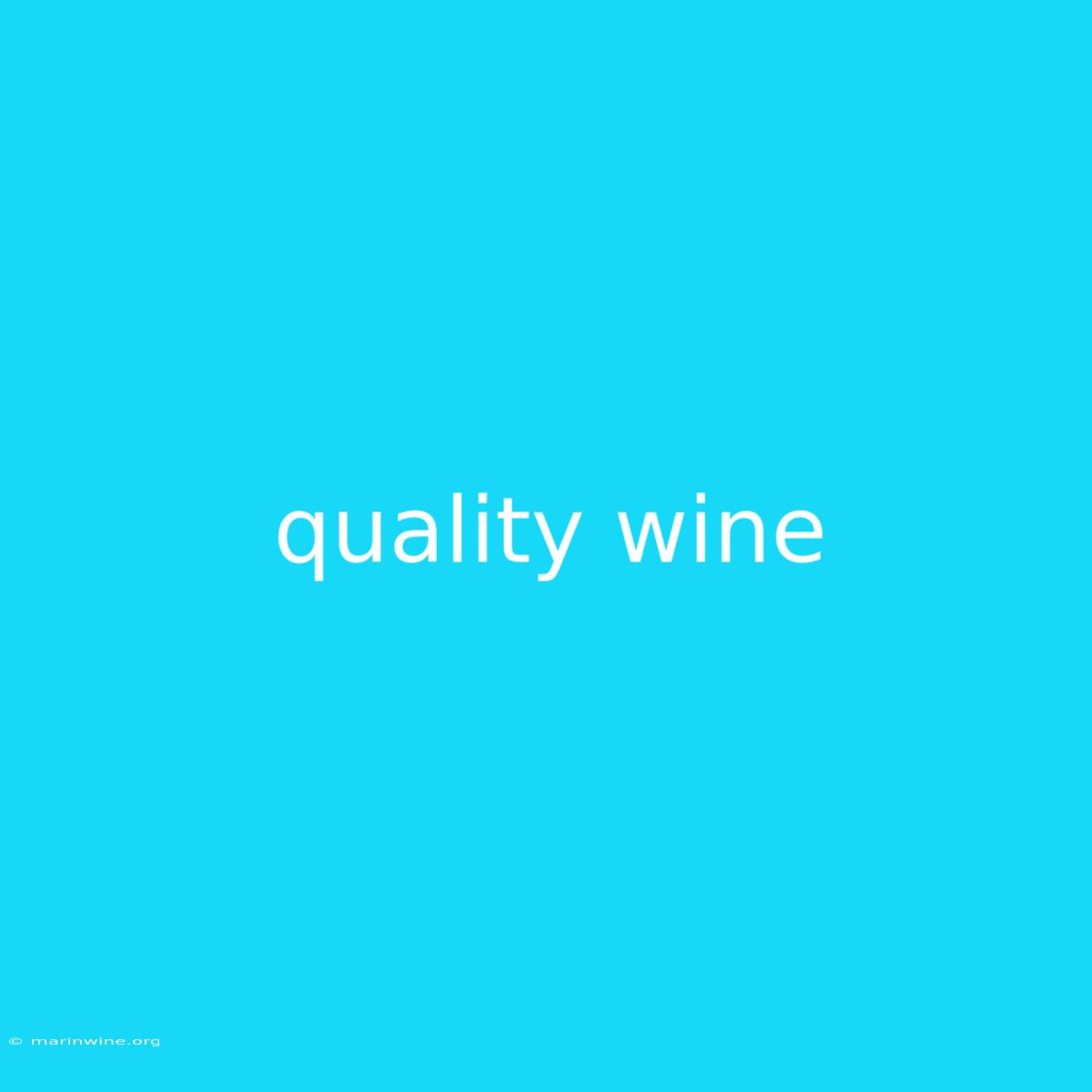Uncorking the Secrets of Quality Wine: A Journey into Flavor and Expertise
Have you ever wondered what makes a wine truly exceptional? It's more than just a pleasant taste; it's a symphony of flavors, aromas, and craftsmanship, each contributing to a truly memorable experience. Let's dive into the fascinating world of quality wine and unravel the secrets that elevate it from ordinary to extraordinary.
Why It Matters: Understanding what makes a wine "quality" goes beyond personal preference. It helps you make informed choices, appreciate the artistry behind each bottle, and truly savor the experience. This article explores the factors that contribute to quality, from vineyard to bottle, and unlocks the secrets of discerning a good wine from a great one.
Key Takeaways of Quality Wine:
| Factor | Description |
|---|---|
| Terroir | The unique combination of soil, climate, and location that gives a wine its distinctive character. |
| Grape Variety | Each grape variety brings its own flavor profile and characteristics to the wine. |
| Winemaking Techniques | From fermentation to aging, the choices made during winemaking significantly impact the final product. |
| Vintage | The year of harvest, which can affect the ripeness of the grapes and ultimately the wine's quality. |
| Tasting Notes | Descriptors used to evaluate the wine's appearance, aroma, taste, and finish. |
The Essence of Quality Wine
Understanding the foundation of quality wine requires exploring key aspects that influence its character:
Terroir: Where Wine Gets Its Identity
Imagine a wine as a reflection of its birthplace. Terroir embodies the unique environmental conditions that shape a wine's character. Soil composition, climate, and vineyard location all play crucial roles. A cool climate might yield wines with crisp acidity, while warmer regions might produce bolder, fruit-forward wines. Similarly, different soil types impact the grapes' growth and the wine's flavor profile.
Grape Variety: The Building Blocks of Flavor
Each grape variety has its own personality. From the elegance of Pinot Noir to the boldness of Cabernet Sauvignon, the grape variety serves as the foundation for the wine's flavor profile. Understanding grape varieties allows you to explore different flavor profiles and discover new favorites.
Winemaking Techniques: Crafting Excellence
The art of winemaking is a delicate dance between science and artistry. Every step, from fermentation to aging, influences the wine's final character. Fermentation techniques, oak aging, and blending decisions all contribute to the wine's complexity and balance.
Vintage: The Impact of Time
The vintage, or year of harvest, can greatly influence a wine's quality. Good weather conditions during the growing season lead to ripe grapes and ultimately a high-quality wine. A vintage might produce a wine with intense fruit flavors or a more nuanced, subtle profile depending on the conditions.
Deciphering the Language of Quality Wine
Tasting notes offer a glimpse into the world of wine appreciation. They provide descriptors that help you understand the wine's appearance, aroma, taste, and finish. Learning the language of tasting notes allows you to communicate your preferences and delve deeper into the world of wine exploration.
FAQ for Quality Wine
Q: How can I tell if a wine is good quality? A: Look for wines with reputable producers, well-defined tasting notes, and awards or critical acclaim.
Q: What are some quality wine regions? A: Bordeaux, Burgundy, Tuscany, Napa Valley, and Rioja are known for their high-quality wines.
Q: What are some signs of a good quality wine? A: Balanced acidity, complexity of flavors, lingering finish, and a sense of place (terroir).
Q: How do I store wine properly? A: Store wine in a cool, dark place with consistent temperatures and humidity.
Q: What are some common wine flaws? A: Cork taint, oxidation, and volatile acidity can negatively impact wine quality.
Tips for Discovering Quality Wine
1. Explore Wine Regions: Each region has its own unique character and wine styles. Try wines from different areas to expand your palate.
2. Talk to Wine Experts: Visit local wine shops or attend tastings to learn from knowledgeable professionals.
3. Read Wine Reviews: Online resources and wine magazines offer reviews and recommendations from experts.
4. Trust Your Palate: Ultimately, the best quality wine is one that you enjoy. Don't be afraid to experiment and find what you love.
Summary by Quality Wine
Exploring the world of quality wine is a journey of discovery, where each bottle offers a unique story. By understanding the factors that influence wine's character and developing your palate, you'll be able to appreciate the complexities and nuances that make each wine truly special. So, uncork a bottle, savor the experience, and embark on your own exploration of quality wine!

